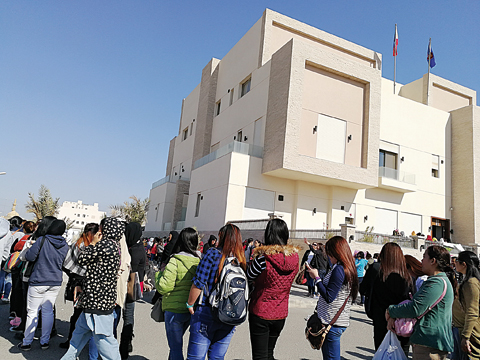Violators urged to secure their travel documents
KUWAIT: The Philippine Embassy in Kuwait yesterday witnessed a large crowd of people eager to take advantage of an amnesty for residency violators announced by the Kuwaiti government. The amnesty went into effect from yesterday for all violators, including absconders and runaways. The Philippine Embassy has advised Filipinos who want to avail of the amnesty to secure their travel documents, especially if they have no valid passports. Those who have valid passports however are advised to go directly to the airport and leave the country without paying any penalty. Those with travel documents will still be subjected to fingerprinting, and if they have cases filed against them, they will not be allowed to leave the country.
 KUWAIT: People lined up outside the Philippines’ embassy in Kuwait yesterday on the first day of an amnesty announced by the Interior Ministry for visa violators. —Photo by Ben Garcia
KUWAIT: People lined up outside the Philippines’ embassy in Kuwait yesterday on the first day of an amnesty announced by the Interior Ministry for visa violators. —Photo by Ben Garcia“I am very pleased to finally get the chance to leave Kuwait after two years without a visa,” said Dally-Ann Quinalagan, who was in the queue at the embassy yesterday. “I am here to get a travel document and am ready to go,” she said. Dally-Ann is a domestic helper from Zamboanga City. She arrived in Kuwait in June 2013 and worked for three years for her original employer. She asked for a release in 2016. Her employer allowed her to leave, but demanded KD 1,000. Dally-Ann failed to pay the amount, leaving her without an iqama.
“I have been living in this country for the last two years without an iqama. Every day I am afraid of the police, because they are checking civil IDs all the time. When I see the police, I hide. Imagine the anxiety I’ve gone through, but thank God I survived,” she said. Dally-Ann is a single mother and if given the chance, she will apply for a job in Kuwait again if the ban on Filipinos is lifted soon. Philippine President Rodrigo Duterte has banned Filipinos from working in Kuwait after several reported cases of mistreatment and abuse.
Julieta Delfin from Davao City also worked as a housemaid, but returned to her recruitment agency. “I left my original employers after working for three months with them. I told them to return me to the agency so I could look for a better employer. The agency sent me to another employer, and they were even worse, so after a few days I told them to return me to the agency again,” she said.
“There were 10 of us at the agency, and we were transferred from one employer to another, but didn’t get our salaries. I told them we need to get a salary because we want to feed our families back home. So the next time they wanted to send me to another employer, I refused. I then left the agency with nine others. We looked and managed to find jobs by ourselves,” Julieta said. She has been working as a saleslady since then. “For the last four years, I managed to avoid police checking. I work and go home after my duty,” she added.
130,000 expatriates
The interior ministry issued a decree granting a general amnesty to expatriates living in Kuwait without valid visas. The amnesty runs between Jan 29 and Feb 22, 2018 and is expected to benefit nearly 130,000 expatriates in violation of residency laws. The amnesty decree (no. 64/2018) gives illegal residents two options - they can either leave the country during the abovementioned period through any port without getting permission from any authority and without paying any penalties; or they can legalize their status and continue residing in Kuwait after paying all fines and obtaining a valid visa without being referred to the investigation department.
Residency violators who are banned from travelling or have a court case should visit the residency affairs department to discuss the possibility of getting a valid visa during the amnesty period. Those who leave the country during this amnesty period are allowed to enter Kuwait again if they meet the regular conditions of entry and if they were not banned for another reason. This decree does not apply to expats who will lose their legal residency status after the amnesty period. If an illegal resident is caught during the amnesty period, they will be deported immediately.
Those who want to legalize their status and stay in the country will pay a penalty of KD 2 for each day up to total of KD 600, even if they were in violation for a longer period. The last time an “amnesty” was granted was in January 2016, but it was partial, as violators who wanted to leave the country still had to pay fines. The last full amnesty (leaving without paying fines) was granted in 2011.
By Ben Garcia










